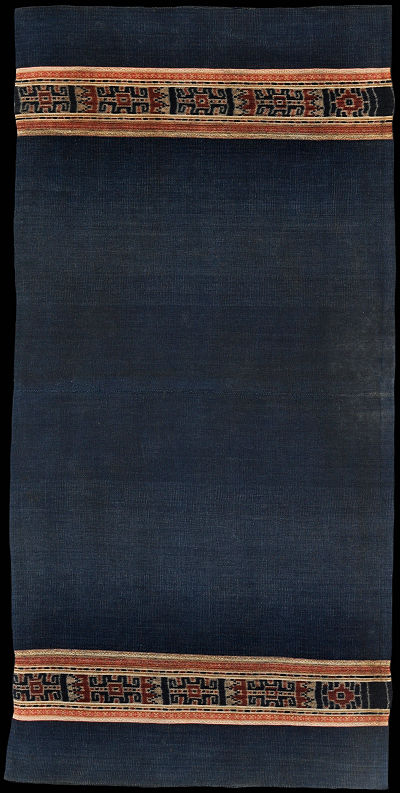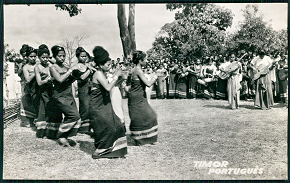| |
 
 | | | |
236 Timor, East Timor
Tais (sarong) 
| | Locale: | Suai-Camenaça, Suai-Loro or Camenaça village, Cova Lima District. Tetun people. | | Period: | Circa 1920 | | Yarn: | Cotton, hand-spun, medium | | Technique: | Warp ikat | | Panels: | 2 | | Size: | 70.5 x 145.5 cm (2' 3" x 4' 9") LW: 2.06 | | Design: | Tais metan with deeply saturated, almost black, indigo field and two bands decorated in ikat. The four leftmost motifs are called lakulo. Those on the right are called baria fuan, bitter cucumber, and matak betek in Suai-Loro. It is actually a stylized version of a patola jilamprang motif. The motifs, lakulo and baria fuan or matak betek, are separated by 'diman three' motifs. The ikated bands have borders of warp-float, foit, on either side, called silu kesak (light brown/cream) and sanak oan (red and cream/ligh brown). | | Comment: | Rare old sarong from East-Timor. According to Barrkman (see work below), this type of tubeskirt is worn draped over a woman's shoulder when she advises family members and neighbours that a relative has passed away. It may also be chosen for everyday use, as well as at ceremonies. This example clearly was used only sparingly. Excellent state of preservation. | | Background: | Chapters on Timor and East Timor. | | Exhibited: | Hong Kong University Museum and Art Gallery, 2017.
Timor: Totems and Tokens, Museu do Oriente, Lisbon, 2019/20. | | Published: | Ikat Textiles of the Indonesian Archipelago, 2018
Timor: Totems and Tokens, 2019.
Ikat Textiles of Timor: Indonesian and Timor-Leste, 2025. | | Compare: | 237 | | Sources: | Near identical to early 20th C. tais metan depicted in Barrkman's contribution to Hamilton, ed., Textiles of Timor, Fig. 8.22 and 8.23. A much younger and less refined tais is shown on Fig. 8.17, making starkly visible the drop in quality over half a century. Very similar to example made 'five generations ago' (presumably at least 100 years ago) by master weaver Bei Ida, shown in Barrkman, The Textiles of Cova Lima, Fig. 7. Idenfitication of motif as jilamprang emulation, Fig. 8.20, caption. Detailed information on motifs by Rosália Soares. Below: tais metan worn during 'Dança de Cobra' in Suai. Postcard, 1950s.
 | | |

©Peter ten Hoopen, 2024
All rights reserved.
|
|


